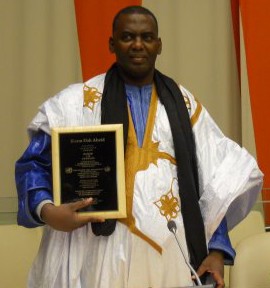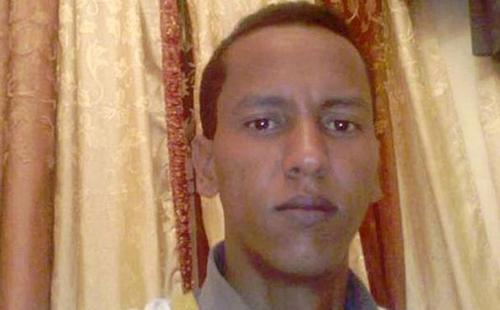Annuler la condamnation à mort du blogueur Mohamed Cheikh Ould Mkhaitir (HRW)
La Cour d’appel doit se prononcer sur le jugement lié à des poursuites pour apostasie
source :
https://www.hrw.org/fr/news/2017/11/07/mauritanie-annuler-la-condamnation-mort-du-blogueur-mohamed-cheikh-ould-mkhaitir
https://www.hrw.org/news/2017/11/07/mauritania-quash-blogger-mkhaitirs-death-sentence
For Immediate Release
Mauritania: Quash Blogger Mkhaitir’s Death Sentence
Appeals Court to Rule in Apostasy Case
(Tunis, November 7, 2017) – Mauritanian authorities should quash the death sentence for a Mauritanian blogger, Mohamed Cheikh Ould Mkhaitir, and drop all charges against him that violate freedom of expression, Human Rights Watch said today. The Court of Appeals in Nouadhibou is due to review the case on November 8, 2017.
Prosecutors charged Mkhaitir with apostasy for posting an online article in January 2014 questioning the use of religion to legitimize ethnic and caste discrimination in Mauritania. After three years of judicial proceedings, Mauritania’s Supreme Court in January set aside a ruling by the Court of Appeals that upheld the death sentence and referred the case to a new panel of judges for review.
“Mauritania has no business charging anyone with ‘apostasy,’ much less sentencing a blogger to death for such an absurd charge based on an article he wrote,” said Sarah Leah Whitson, Middle East and North Africa director at Human Rights Watch. “It’s good that the appeals court is reviewing this case, but he never should have been charged in the first place.”
Human Rights Watch raised concerns about the conviction, lengthy procedure, and extreme sentence Mkhaitir is facing for a speech offense with Justice Minister Mohamed Ould Daddah during a meeting in Nouakchott on October 19. “Mkhaitir is entitled to a fair trial in line with our international commitments,” he told Human Rights Watch. “I hope that he will be tried by the end of the year.”
It has almost been four years since Mauritanian authorities arrested Mkhaitir after the Mauritanian news website Aqlame published his blogpost on the marginalization of certain groups in Mauritania. He spent 12 months in pretrial detention, and a court sentenced him to death in December 2014 for “speaking lightly” of the Prophet and heresy.
In 2016, the Court of Appeals in Nouadhibou lowered the charges from “apostasy” (zendagha) to “disbelief” (ridda) but maintained the death sentence. The defense appealed the case to Mauritania’s Supreme Court, which set aside the lower court’s decision on January 31, 2017, and sent the case back to a new panel of judges from the same Court for a new hearing.
Some Mauritanian activists have noted that there has been an outpouring of protests over the article on religious grounds. Over the last two-and-a-half years, thousands of protesters have gathered on a number of occasions to call for Mkhaitir’s execution. On November 3, Mohamed Diop, journalist for the Mauritanian news agency Alakhbar, reported that police authorities prevented protesters calling for Mkhaitir’s execution from marching in the streets of Nouakchott and arrested four of them.
Mauritanian human rights activists who have publicly supported Mkhaitir have received death threats, Aminetou Mint Ely, a prominent women’s rights leader, told Human Rights Watch. In December 2016, Mkhaitir’s parents fled the country and sought asylum in France stating that they could no longer live in Mauritania under permanent threats.
Mauritania’s prosecution of Mkhaitir for his writing violates the international law guarantees protecting free speech, such as those enshrined in the International Covenant on Civil and Political Rights, to which Mauritania has been a party since 2004. The Mauritanian constitution guarantees freedom of opinion, thought, and expression. Restriction of speech, and in particular criminal prosecutions, should only be used as last resort, for a justifiable reason, when the law is clearly defined and the restriction is proportionate. Mkhaitir’s speech, given it could not conceivably be construed as incitement to violence or hatred, should never have been subject to prosecution.
Both United Nations and African human rights standards on the right to life encourage states to move toward abolition of the death penalty and in those states that retain the death penalty make clear it should be limited to the most serious crimes and can only be imposed after a fair trial. The African Commission on Human and Peoples’ Rights has stated that: “In those States which have not yet abolished the death penalty it is vital that it is used for only the most serious crimes – understood to be crimes involving intentional killing.”
Mauritanian prosecutors should drop the charges against Mkhaitir, Human Rights Watch said, and Mauritanian legislators should repeal penal code provisions that violate freedom of expression, including Article 306, which provides the death sentence for apostasy.
For more Human Rights Watch reporting on Mauritania, please visit:
https://www.hrw.org/middle-east/n-africa/mauritania
For more information, please contact:
In New York, Sarah Leah Whitson (English): +1-718-213-7342 (mobile); or whitsos@hrw.org. Twitter: @sarahleah1
In New York, Ahmed Benchemsi (English, French, Arabic): +1-929-343-7973 (mobile); or benchea@hrw.org. Twitter: @AhmedBenchemsi
https://www.hrw.org/ar/news/2017/11/07/311088
للنشر الفوري
موريتانيا: نقض حكم الإعدام بحق المدوّن امخيطير
محكمة الاستئناف تنطق بالحكم في قضية الردة
(تونس، 7 نوفمبر/تشرين الثاني 2017) – قالت « هيومن رايتس ووتش » اليوم إن على السلطات الموريتانية إلغاء عقوبة الإعدام بحق المدون الموريتاني محمد الشيخ ولد امخيطير، وإسقاط جميع التهم الموجهة إليه والتي تنتهك حرية التعبير. من المقرر أن تنظر « محكمة الاستئناف » في نواذيبو في القضية بتاريخ 8 نوفمبر/تشرين الثاني 2017.
اتهم الادعاء امخيطير بالردة بسبب نشره مقالا على الإنترنت في يناير/كانون الثاني 2014، يتساءل فيه عن استغلال الدين لتشريع التمييز العرقي والطائفي في موريتانيا. بعد 3 سنوات من الإجراءات القضائية، ألغت « المحكمة العليا » في موريتانيا في يناير/كانون الثاني، حكما صادرا عن محكمة الاستئناف يؤيد الحكم بالإعدام وأحالت القضية إلى هيئة قضاة جديدة للمراجعة.
قالت سارة ليا ويتسن، مديرة قسم الشرق الأوسط وشمال أفريقيا في هيومن رايتس ووتش: « ليس لموريتانيا الحق في تجريم أي شخص بـ »الردة »، فكيف بالحكم على مدون بالإعدام بسبب تهمة سخيفة على أساس مقال كتبه. من الجيد أن تقوم محكمة الاستئناف بمراجعة هذه القضية، لكن لم يكن هناك ما يوجب توجيه الاتهام إليه من الأساس ».
أثارت هيومن رايتس ووتش مخاوف بشأن الإدانة والإجراءات المطولة والعقوبة القصوى التي يواجهها امخيطير، خلال اجتماع مع وزير العدل محمد ولد دادا في نواكشوط بتاريخ 19 أكتوبر/تشرين الأول. إذ قال لـ هيومن رايتس ووتش: « يحق لامخيطير الخضوع لمحاكمة عادلة تماشيا مع التزاماتنا الدولية. آمل أن يُحاكم قبل نهاية العام ».
مضت قرابة 4 سنوات منذ أن اعتقلت السلطات الموريتانية امخيطير إثر نشر موقع أخبار موريتاني يدعى « أقلام » مدونة حول تهميش مجموعات محددة في موريتانيا. أمضى امخيطير 12 شهرا في الحبس الاحتياطي، وحكمت عليه محكمة بالإعدام في ديسمبر/كانون الأول 2014 للهرطقة و »الحديث باستخفاف » عن النبي.
في 2016، خفضت محكمة الاستئناف في نواذيبو الاتهامات من « الزندقة » إلى « الردة »، غير أنها أبقت على عقوبة الإعدام. استأنف الدفاع القضية في المحكمة العليا بموريتانيا، والتي ألغت قرار المحكمة الأدنى في 31 يناير/كانون الثاني 2017، وأرسلت القضية مرة أخرى إلى لجنة جديدة من القضاة من نفس المحكمة لعقد جلسة استماع جديدة.
لاحظ بعض النشطاء الموريتانيين أن هناك احتجاجات على المقالة لأسباب دينية. على مدى العامين ونصف الماضيين، تجمع الآلاف من المتظاهرين في عدد من المناسبات للدعوة لإعدام امخيطير. في 3 نوفمبر/تشرين الثاني، أفاد محمد ديوب، وهو صحفي في وكالة الأنباء الموريتانية « الأخبار »، أن الشرطة منعت المتظاهرين المطالبين بإعدام امخيطير من المسير في شوارع نواكشوط واعتقلت 4 منهم.
قالت إمنيتو مينت إلي، وهي ناشطة بارزة في مجال حقوق المرأة، لـ هيومن رايتس ووتش إن الناشطين الموريتانيين في مجال حقوق الإنسان الذين دعموا امخيطير علنا تلقوا تهديدات بالقتل. في ديسمبر/كانون الأول 2016، هرب والدا امخيطير من البلد وطلبا اللجوء في فرنسا، معلنَين عدم مقدرتهما على العيش في موريتانيا تحت التهديد الدائم.
تنتهك مقاضاة موريتانيا لامخيطير على كتاباته ضمانات القانون الدولي التي تحمي حرية التعبير، كتلك المكرسة في « العهد الدولي الخاص بالحقوق المدنية والسياسية »، الذي انضمت إليه موريتانيا عام 2004. يضمن الدستور الموريتاني حرية الرأي والفكر والتعبير. ينبغي ألا يُستخدم تقييد حرية التعبير، والمحاكمات الجنائية بالذات، إلا كملجأ أخير، ولسبب مبرَّر، عندما يكون القانون محددا بوضوح ويكون التقييد متناسبا. يجب ألا يحاكم امخيطير على خطابه، نظرا لاستحالة اعتباره تحريضا على العنف أو الكراهية.
تشجع المعايير الأممية والأفريقية لحقوق الإنسان، المتعلقة بالحق في الحياة، الدول على التحرك نحو إلغاء عقوبة الإعدام، وتوضح أن على الدول التي تبقي على عقوبة الإعدام أن تقصرها على أخطر الجرائم ولا تفرضها إلا بعد محاكمة عادلة. ذكرت « اللجنة الأفريقية لحقوق الإنسان والشعوب »: « على الدول التي لم تلغ عقوبة الإعدام بعد، أن تستخدمها فقط لأشد الجرائم خطورة – وهي القتل العمد ».
قالت هيومن رايتس ووتش إن على « النيابة العامة الموريتانية » إسقاط التهم الموجهة ضد امخيطير، كما على المشرعين الموريتانيين إلغاء أحكام قانون العقوبات التي تنتهك حرية التعبير، بما في ذلك المادة 306 التي تنص على عقوبة الإعدام بسبب الردة.
للمزيد من تغطية هيومن رايتس ووتش لموريتانيا:
https://www.hrw.org/ar/middle-east/n-africa/mauritania
للمزيد من المعلومات:
في نيويورك، سارة ليا ويتسن (الإنغليزية): +1-718-213-7342 (خلوي)؛ أو whitsos@hrw.or. تويتر: @sarahleah1
في نيويورك، أحمد بن شمسي (الإنغليزية والعربية والفرنسية): +1-929-343-7973 (خلوي)؛ أو benchea@hrw.org. تويتر: @AhmedBenchemsi




